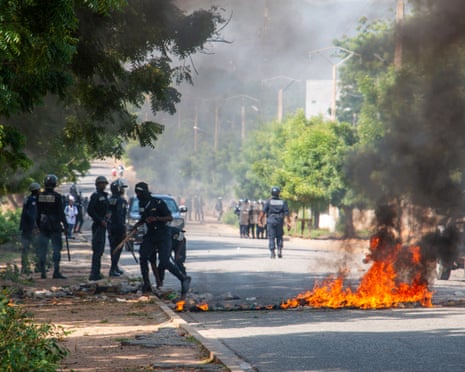
At least two people have been killed and dozens of protesters arrested in Cameroon as the government cracks down on dissent before the announcement of final results in this month’s presidential elections.
Local media reports, citing preliminary data from the electoral commission (Elecam), suggest that victory for the 92-year-old incumbent, Paul Biya, is all but certain. That prospect has provoked anger and disbelief among his opponents, leading to unrest across several regions.
Biya, who has been in power since 1982 and is president of the ruling Cameroon People’s Democratic Movement (CPDM), is the world’s longest-ruling head of state.
In a statement released earlier this week, Clément Atangana, head of the Constitutional Council, confirmed the official results would be published on 27 October. The council has already dismissed 10 petitions alleging electoral malpractice, including several filed by opposition parties, in decisions that have only deepened public distrust in the process.
Issa Tchiroma Bakary a former long-time Biya ally turned foe who leads the Cameroon National Salvation Front, declared himself the winner earlier this week, claiming to have secured 54.8% of the vote against Biya’s 31.3%.
Tchiroma said the Constitutional Council would be “complicit in a breach of trust” if it upheld results that he said had been manipulated. “The vast majority of the Cameroonian people will never accept that the council validates the historic scale of ballot stuffing and falsification,” he said.
Biya’s ruling party has denounced Tchiroma’s victory claim as “a grotesque hoax” and an “unacceptable fraud in a state of law”, saying in a statement it was “calmly awaiting the official results”.
Protesters clashed with security officers who threw teargas canisters on Wednesday in Tchiroma’s hometown of Garoua, in the north. At least two people were killed, including a teacher who died after stray bullets hit her. There were also demonstrations in the capital, Yaoundé, where crowds who gathered in key administrative areas were quickly dispersed by security forces.
In the city of Maroua, in the Far North region, one of Cameroon’s poorest and Tchiroma’s political stronghold, the anger has taken on a deeply personal tone. Outside the office of the regional governor, a group of young people left a handwritten letter expressing desperation over poverty and political exclusion.
“The young people of Maroua are writing to you today to inform you that we are fed up with this country because the Far North region is the poorest region,” it read. “All the citizens voted for Issa [Tchiroma], but the government wants to rig it. It’s better to go join Boko Haram in Sambisa [in Nigeria near the border with Cameroon] than to stay for another seven years. If you let us go, you and the CPDM activists will pay with blood in Maroua.”
Authorities have moved quickly to try to quash dissent. In a televised address, the minister of territorial administration, Paul Atanga Nji, said more than 20 people detained during the protests would face trial before a military tribunal.
“They face serious charges, including incitement to rebellion and insurrection,” he announced, warning that the government would not tolerate actions that threatened public order.
There were reports of internet restrictions in the commercial capital of Douala and other parts of the country on Wednesday and Thursday, confirmed by the internet monitor NetBlocks. Camtel, the state operator, blamed connectivity disruptions on “a technical incident involving Wacs cable” and said service was gradually being restored in “certain areas”.
The respected National Episcopal Conference of Cameroon has called for calm. “It is our prayer that, with the help of God and the commitment of all, our country will experience peace and stability in truth and will emerge stronger,” Andrew Fuanya Nkea, the archbishop of Bamenda and president of the NECC, said on Tuesday.